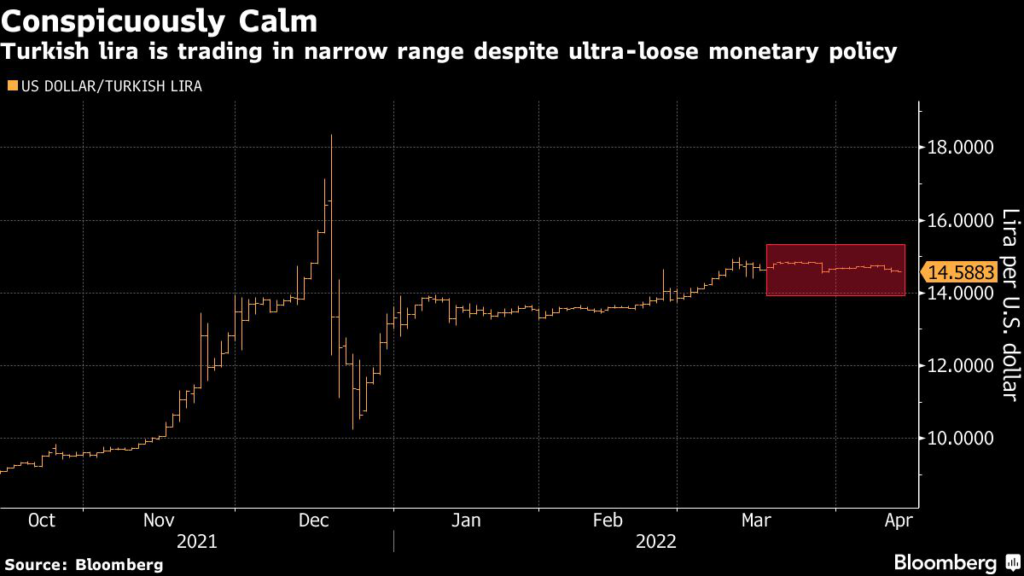(Bloomberg) — Sign up for the New Economy Daily newsletter, follow us @economics and subscribe to our podcast.
Turkey is set to refrain from raising interest rates for a fourth straight month despite a surge in inflation past 60%, putting more onus on the central bank’s unconventional policies to tether the lira.
Deepening trade imbalances and the world’s most negative borrowing costs when adjusted for prices have made the $800 billion economy increasingly vulnerable at a time of intensifying global tightening led by the U.S. Federal Reserve. All economists surveyed by Bloomberg predict Turkey’s central bank will hold its benchmark at 14% on Thursday, after it halted a series of rate cuts at the end of last year.
It’s a risky balancing act that hinges on keeping Turkey’s currency stable for longer with measures that include a costly program to shield savers from lira weakness, and foreign-exchange sales, which Bloomberg reported on April 7 were carried out via state banks, according to traders. So far the lira has held firm, becoming one of a handful of emerging-market currencies to appreciate against the dollar this month.
“The market may start to fear that things go sour at some point, accelerating the lira sell-off,” said Cristian Maggio, head of portfolio strategy at TD Securities. “Inflation will continue to rise and Turks will get impoverished by a massive loss of purchasing power.”
Under pressure from President Recep Tayyip Erdogan, a self-described “enemy” of interest rates, the central bank led by Governor Sahap Kavcioglu has yet to signal it’s anywhere near a policy adjustment after ending last year with 500 basis points in monetary easing. The multiple rate cuts triggered a collapse in the currency and touched off inflation.
Rather than adding to Turkey’s rate buffer, authorities are now leaning even more heavily on other policies that could bring in more hard currency and boost the central bank’s reserves.
Turkey is discussing a proposal to mandate exporters to convert more of their foreign revenue into lira, alongside another plan to offer tax incentives for companies’ earnings from converting hard currency.
What Bloomberg Economics Says…
Despite its recent stability, the lira remains among the worst-performing emerging market currencies this year. It’s facing pressure from runaway inflation, a high commodity-import bill and rising U.S. yields. Keeping rates on hold add another ingredient to this explosive mix.
— Ziad Daoud, chief emerging markets economist. For full react, click here.
The soaring cost of commodities and energy has left Turkey more exposed this year. Central banks around the world are meanwhile raising rates to combat inflation amid risks from Russia’s invasion of Ukraine and worsening supply-chain disruptions.
A more stable lira has hardly moved the needle for inflation, which surged in March to a fresh two-decade high of over 61% from a year earlier. Finance Minister Nureddin Nebati now anticipates price growth will start declining from December — after earlier predicting it could peak in April and then expecting it would slow from this summer.
With the U.S. central bank likely to move more aggressively in the months ahead after a quarter-point hike in March, the time left for Turkey to act may be short.
“The lira seems to be trading on very thin ice, which may crack soon as the Fed intends to raise rates rapidly to rein in inflation,” said Piotr Matys, an analyst at InTouch Capital Markets Ltd.
More stories like this are available on bloomberg.com
©2022 Bloomberg L.P.











